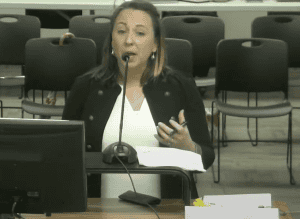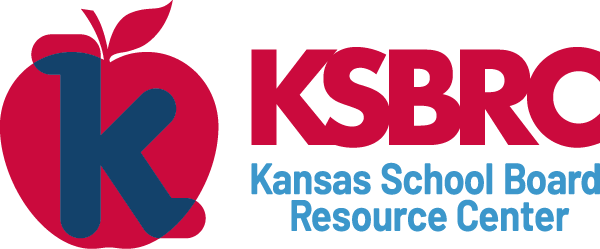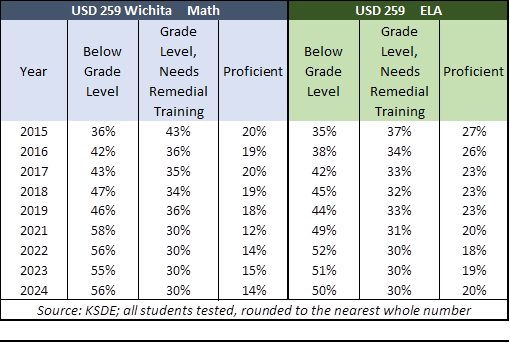Kirsten Workman of Lansing says her research shows the Second Step Social-Emotional Learning (SEL) program for middle schoolers is ineffective in improving student outcomes or decreasing behavior incidents, promotes social activism and Critical Race Theory, and has a history of using outside resources to expose children to sexually explicit content.
Workman spoke to the monthly meeting of the Kansas State Board of Education. A nurse, Workman also serves as a school board member of Lansing USD 469, although she spoke to the state board as a concerned parent and not as a board representative.

We asked Workman the difference between Second Step and the curriculum she prefers, The Leader in Me:
“Second Step is a brand of Social-Emotional Learning Curriculum offered by the Committee for Children. Second Step refers to its curriculum as “transformative SEL,” a type of SEL curriculum that seeks to use social-emotional instruction in schools (i.e. our children) to transform society into a more “just and equitable” environment.
“In short, its social activism masquerading as K-12 character development.
“Leader In Me is curriculum that takes the leadership framework of Franklin Covey’s “7 Habits of Highly Effective People” and applies it to K-12 education. Students are taught to lead first within themselves and to focus on setting and achieving goals. Comparing the research will show that not only is Leader In Me TRULY evidence-based curriculum with positive academic results (unlike Second Step Middle School), but it also has a positive effect on teacher retention.
“To characterize the difference in my own words; Second Step wants students to change society to make it more fair, Leader in Me teaches students the habits and perspectives that will make them successful in any circumstance, fair or not. Leader in Me is about personal accountability for individual success, Second Step is about holding society accountable for individual success. Leader in Me unifies a school community behind its own shared values and goals, Second Step divides school community members by categorizing them as “privileged,” versus “oppressed.” One ignites potential, the other squelches hope.”
Wabaunsee USD 329 has seen steady progress in academic achievement post-pandemic using The Leader in Me. Superintendent Troy Pitsch told The Sentinel in late 2022 that other Kansas schools want to know how Wabaunsee does it:
“Some have requested the opportunity to visit the district and learn more about USD 329’s approaches to student learning.”
Second Step description obscures content
The developers of Second Step, The Committee for Children, defends its program on its website, but doesn’t explain the content:
- Lessons Are Engaging
The lessons are only 25 minutes long. Plus, no two lessons are exactly the same, which keeps things exciting. - “Real Voices” of Middle School Students Are Represented
For the new curriculum, 250 students from 10 different locations were asked about life in middle school. They provided feedback in a video kiosk that included a mounted tablet system with a camera. The kiosks were in private locations so students could talk openly about their thoughts, feelings, and experiences using their own words. - Students Have Regular Opportunities to Connect Personally with Learnings
Students have many opportunities for self-reflection, which fosters self-awareness, one of the big five social-emotional learning (SEL) competencies. - There Are Ongoing Opportunities for Giving Feedback About the Lessons
Adults who teach the lessons can provide Committee for Children with feedback about each lesson, including what they liked best and how the lesson could be improved. - No More Need for Paper Copies of Handouts
This may be especially exciting for those of you on a limited copying budget. Because the curriculum is digital, handout examples are provided on the screen, so although printed handouts remain an option, they aren’t needed.
Workman is concerned that Second Step has a foothold among the education establishment in Kansas:
“Unfortunately, Second Step Middle School seems highly respected by our KSDE leadership, who refer to it as an ‘evidence-based’ curriculum with ‘promising’ results, despite limited research showing abysmal findings. One of the mere two studies conducted had to eliminate the Kansas cohort of students from the sample in order to find any statistical significance of its effectiveness whatsoever.
“What I find most troubling is that KSDE would even entertain including a company like Second Step on any list of approved curriculum given its 2019 history of exposing 7th and 8th graders to sexually explicit content via referrals to third-party websites like LoveIsRespect.org. I would think a company like the Committee for Children, which began with a mission to prevent child sex abuse, would be ashamed of themselves for not only encouraging children to explore their sexuality online but teaching them practical tips for how to hide that information from their parents.”

State Board Member Dennis Hershberger was impressed by Workman’s research on the issues involved:
“Kirsten each gave us a “manual” of 3 studies to back up her presentation, and I am presently reading through it. My impression is that her testimony is packed with strong evidence for a move away from Second Step. I personally see SEL as an anemic effort to minimize destructive behavior when classical style education taught with rigor challenges students and behavior improves. The young mind is fashioned by God to want to learn and, when given the opportunity, in most cases, will grasp onto that challenge.
“This will be an ongoing conversation in Kansas as mental health and behaviors are being affected by so many negative factors of society. The “Blue Ribbon Task Force on Screentime,” to start this week, hopefully will shed some light on maybe the most overt problem that middle schoolers face: social media.
“I am reading everything I can find that will expose the rationale for SEL and if it is legitimate.”






